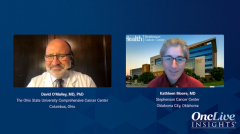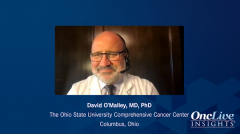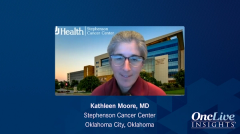
Unmet Needs and Clinical Pearls for Metastatic Endometrial Cancer
Before closing out their conversation on endometrial cancer, Kathleen Moore and David O’Malley summarize unmet needs in the field and share a few clinical pearls on managing patients with the disease.
Episodes in this series

Transcript:
Kathleen Moore, MD: As we think about unmet needs for this population, I’ll hazard to guess that it will be positive to include immune checkpoint inhibitors in some of these very high-risk situations of adjuvant treatment. We talked about stage IIIC1 and IIIC2 [endometrial cancer], with multiple nodes positive, where the chance of recurrence is over 50% in mismatch repair deficient. You may cure more of those patients; some may recur later. We’ll be in this post–I/O [immuno-oncology] setting. Either way, if you have patients who do very well for a long period of time post–I/O and then they recur, what do you do post–I/O?
We have studies open. The study that you mentioned has some post–I/O arms. With the NCI [National Cancer Institute], our friend Dr Haider Mahdi is running NRG-GY025, which is a randomized study of nivolumab vs nivolumab-ipilimumab in patients with recurrent uterus cancer who are mismatch repair deficient. It allows prior I/O as long as it’s been more than a year. It’s targeting patients who received it in an adjuvant setting and then recurred. If you use a monotherapy immune checkpoint inhibitor, will it work just fine, or do you need that combination? Those are 2 examples of where we’re already doing the studies. To meet that, there probably won’t be a very high unmet need. Are there other high unmet needs that you can identify that we’re going to need to start or that are already needing trials, or are you designing other trials to address?
David O’Malley, MD: Post–I/O is absolutely our highest unmeant need. But what’s most important is how we cure more patients. Then I’m going to throw a bit of a curve ball. Maybe we need to start talking about de-escalating therapy. Who are those patients for whom we could omit chemotherapy? Maybe even omit adjuvant therapy? We need to start to identify those patients. For me, the highest unmet need without a doubt is post–I/O recurrence. But as you said, [we need to] be much smarter and much more precise—true precision medicine. What are we going to give the patient? Do we need to throw the kitchen sink at them, or is 1 targeted therapy or 1 immunotherapy enough? That’s probably our next greatest unmet need.
I’ve had so much fun. I love talking to you. You’re 1 of the smartest people I know. Thank you for having me tonight, Dr Moore. I appreciate it.
Kathleen Moore, MD: Thank you for joining me. This was a lot of fun, and I hope our audience found this program informative. Thank you.
Transcript edited for clarity.






































